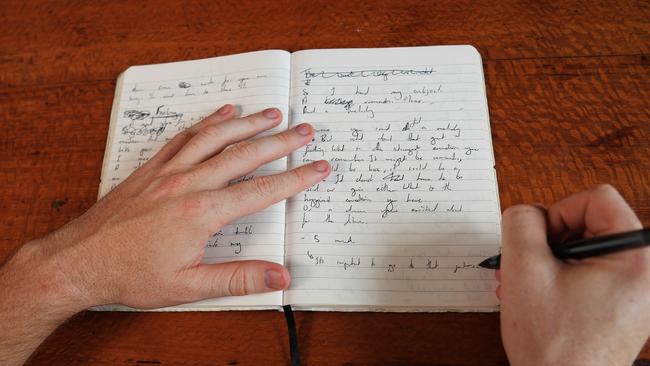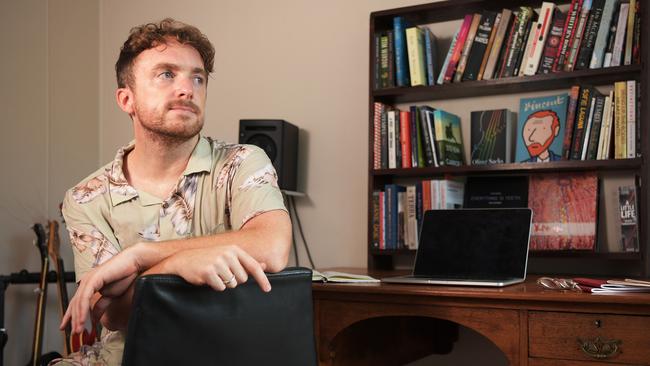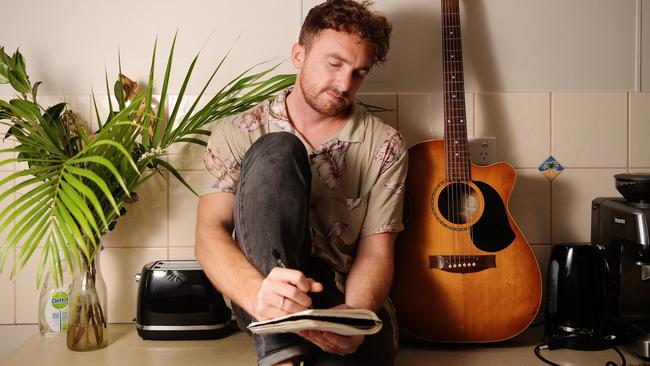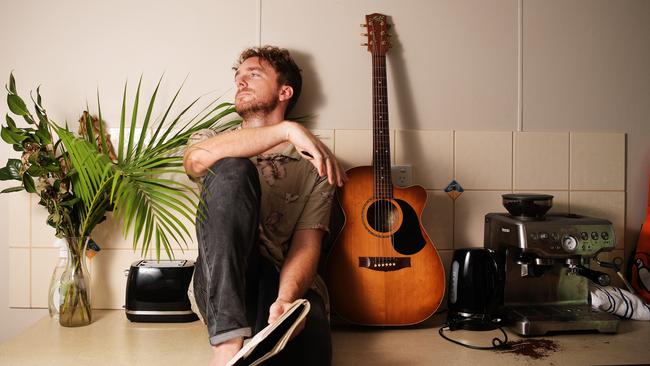AN award-winning songwriter and novelist from Western Australia, Sam Carmody is now making the Northern Territory his home. STEVE VIVIAN reports
At his desk in Nightcliff, shortly after daybreak, formless shadows pass beneath while the most vivid villains pull up a chair.
But these malign forces, these black holes which sweep around him like the ghost net of a super trawler, aren’t unwelcome pre-breakfast guests.
They’re a heartening sign for Carmody that the muse has arrived, and it’s time to get down to some serious writing.

BEFORE moving to Darwin in 2015 to teach creative writing at the Batchelor Institute, Sam Carmody was well on his way to becoming one of Australia’s most touted literary talents.
His debut novel, The Windy Season, was published the next year, short-listed for the Vogel Award and took out the Readings Prize for New Australian Fiction. The novel, set in Stark, a fictional fishing town on the West Australian coast, is at the same time adventure novel and devastating denunciation of Australian masculinity.
Stark is a town where the abstract threat of finned monsters off the coast dominates discussion, while the ever-present threat of the real predators on land circles in the background to “the trebly call of dog racing” beneath TAB televisions.
In Stark, the book’s protagonist, Paul, finds himself working on a crayfishing boat while in search of his missing brother. There Paul is confronted by the primitive ideal of Australian masculinity: men like vicious ‘Roo Dog’, liable to glass you at any minute when your back is turned. Consumed by the “wretched empty spaces” of Stark, Carmody found himself writing despairingly, like he too was in a dangerous place.
For what he produced in The Windy Season, in its emotional honesty and power of facing up to the volatilities and vulnerabilities of Australian men, Carmody’s writing is forever yoked to another West Australian writer, Tim Winton.
But some three years later, Carmody believes he was looking back, somewhat unhelpfully, in anger.
“My views are evolving I think. Writing The Windy Season I realised halfway through that I was writing pretty angrily about Australian men, for the way I felt like that upbringing doesn’t really equip you well for life,” he said.
“I think as young boys we’re taught to try and dominate situations or sort of somehow control our environment. But life isn’t controllable, which causes existential distress.”
Growing up in Geraldton on the West Australian coast, Carmody witnessed and felt the blunt force of male aggression and violence.
“I think that’s what I was writing angrily about at the time, what I thought was a bullshit construction about it how it was we we’re taught to go through life. I realised I was kind of traumatised by male violence as a kid. It was all around us.
“But I realised at the end of the book I’d been looking two-dimensionally at it, and not recognised the suffering men experience in a world where they have to perform these certain roles and be a certain way, which messes them up because they don’t have, perhaps, the emotional language to understand themselves … We become a danger to ourselves as much as we are to others.”
As a child growing up in Geraldton, Carmody remembers making his grandmother Freda bourbon and cokes.
Freda Vines was widowed in her early twenties when her husband’s bomber was shot down in the Gulf during World War II.
Freda would go on to become an accomplished author, like Carmody, writing novels set along the West Australian coast, attracted to the darkness in people, landscapes and the ocean.
Carmody was living with Freda when she died, and remembers her as a hero.
“We were always really good mates ever since I was really little. I was always making her drinks, we talked a lot, and I didn’t realise then how similar we actually were,” he said.
“It is sad in a way because I then went to university and I realised, ‘Holy shit, I‘m kind of my grandmother’ … she was my first writing mentor, I think.”
A great white shark used to swim up and down the hallway of Carmody’s childhood home. He couldn’t go to the bathroom, or stop the nightmares.
So Freda would slip young Sam books all about sharks, until as a little kid he became “a miniature expert” on the topic.

BETWEEN furrowing his brow in thought and raising both eyebrows in measured speech, Carmody’s blue eyes flash out behind a pair of sunglasses during conversation.
At the start of a new thought his arms are crossed, but soon he’s rubbing his hands together, as if generating a kind of mental friction. As his ideas become more fluid, Carmody’s hand movements are flowing. His eyes, however, remain glassy, steeped in the sea, barely seeming to deviate from the horizon.
Staring out into the cloudy Darwin sky, Carmody says he at one point found himself at a loss as to how to finish The Windy Season.
“There was an essential problem I hadn’t solved — I didn’t know what had happened to this missing person,” he said.
Carmody turned inland to Swift, a character in the novel from Tennant Creek.
While writing about Swift, Carmody stitched up a few plot holes. But living in the Territory, Carmody says, has opened up whole new veins to his creativity.
“Moving to Darwin has been an education on how complicated our country is and just how serious its challenges are, and also just how magnificent its people are … I think it will take a lifetime to try and understand a place like this,” he said.
“Living in Darwin, you realise that it is worthy of being written on the page. I think living in regional areas we have this humility where we think our lives are a bit simple, or nothing special, but they’re just as rich and complex as any urban life.”
And Darwin hasn’t just helped Carmody’s writing.
“Every time a writer hears about another writer’s success, a little part of them dies.”
Sam Carmody has heard that quote somewhere before, and he uses it to illustrate the competitiveness, and even hostility, of the literary culture of cities down south.
The line he’s referencing could be mutation of Gore Vidal’s quip, “Whenever a friend succeeds, something inside me dies”.
Both quotes apply to Carmody, who has found in the Top End both a supportive arts scene lacking any pretension, and friends who relish in one another’s achievements.
“I think in cities there is a competitiveness that is detectable almost all the time. Here it just never feels like that. There’s a lot of great artists working out of Darwin, people Mary Anne Butler, Stevie Jean and Baker Boy, and you feel like you’re in it together,” he said.
“Up here there is a real feeling that you’re an underdog, and there can be a real cynicism in the way critics respond to regional writing. Tim Winton calls it the whiff of redneck arm pit.
“These critics are quick to discount a complexity, to think maybe you’re writing something that’s parochial. It’s a kind of elitism. A readiness to read regions as simple-minded, when there’s so much more going on.”
And that’s important for the novelist who also writes music.
More than writing, it’s the first place he turns when life hits turbulence, and Carmody’s ability to channel his emotional weather into soaring indi folk music has, like his writing, been met with awards and acclaim.
After playing in bands since his early teens, Carmody put out his first solo release, Shadow in the Dream, last year, and hopes to release an album within the next 12 months. Sometime in April he will update his Spotify and Soundcloud pages with a new track. A few April shows are also in the works, with a gig on Friday, April 19 booked in with a location TBA.
“I think the male voice just sounds so good when it’s reaching, stretched almost out of its range,” Carmody says.
“Which is pretty funny — it’s so un-Australian really to write operatic pop music, but it’s the thing I’ve always been drawn to.”

“THERE are worse things out there than sharks,” warns the opening line of The Windy Season.
By mid-novel, the men of Stark, hollowed out by trauma which they fill with beer and long silences, are obsessed with brutalising the beasts they fear.
Pulled from the sea, these sharks are stabbed, sawn and maimed for therapy.
Turning to the place of crocodiles in Territory culture, Sam Carmody sees a similar obsession at play.
“In the sense that there’s this fear and revulsion. I think people are kind of terrified of them and they do get shot a lot, but there’s also this weird love or fascination,” he said.
“There’s a quote by biologist Edward Wilson that in a deeply tribal sense we love our monsters. We love our crocodiles. They enrich our experience of life in some way, in that they can literally tear us apart. They remind us that we’re part of the environment, because they don’t see us as different from the environment.
“What predators do that’s really helpful is they remind us that we are connected to a larger system. I think when you feel disconnected from your own life or from the world around you, that’s when you can fall into a thing like depression.
“It’s very hard to be depressed if a shark or a croc is circling you in the water. Suddenly life becomes very valuable, and maybe that’s what crocs remind us of in the NT News every morning.
“That life is precious, that we’re of this world, and that we’re not separate.”

“WHENEVER someone says they have read The Windy Season, I feel a bit of guilt,” Carmody admits.
“I was aware that what I’d left for people to try and wade through was a lot of darkness,” he said.
Although he’s back at his desk writing a sequel, Carmody isn’t trying to shut that darkness out.
His follow-up novel pulls at the threads of good and evil in our culture, and in doing so, Carmody says, “resists what are ultimately false layers against understanding the world”.
“I do feel like when writing a job you do have is to shine a light on darkness in your own world and culture, but I think it is also the role of the artist to recognise beauty, too.
“To write into a place where people don’t ever either have the courage or power to speak, and give something that’s formless and overwhelming and incomprehensible some kind of shape.”
Until that comes out, Carmody will be sitting at his desk, letting his muse overwhelm him until the words are on the page.
And his fans will wait, with bated breath, to read his stories.
The Windy Season, by Sam Carmody (Allen & Unwin, 330pp, $29.99) can be found online and in local bookstores
Sam Carmody’s music can be found on Spotify and Soundcloud


Add your comment to this story
To join the conversation, please log in. Don't have an account? Register
Join the conversation, you are commenting as Logout
Sonny’s search: What’s bringing this SANFL legend to Alice Springs
For more than 50 years, a SANFL legend – and stolen generation survivor – has been returning to Alice Springs on a deeply personal search. Now, he’s had a breakthrough.
‘It’s a coup’: ‘Terminated’ Alice Springs principal’s explosive allegations
The former principal of troubled Alice Springs school is alleging he was sacked after standing his ground over a proposal which is going to be ‘a sh-t show’.